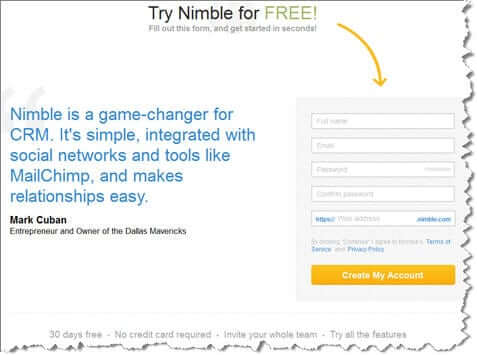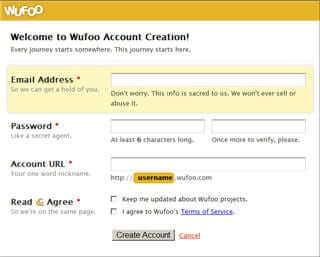Getting prospects to click on a link to claim a free trial or other offer is only half the battle. How do you get them to fill in the blanks?
Social selling – identifying sales leads through social media — is rooted in the process of building customer relationships. There are countless unstructured ways to accomplish this customer management, a lot of which depends on your own personality, passions and style.
 Landing pages, on the other hand, offer a more direct, cut-and-dried method. Someone who has filled out a form on your website or blog – or in response to an email – is interested in your company, perhaps intrigued by the offer of a free sample or trial, a white paper or a contest, and could be a solid lead.
Landing pages, on the other hand, offer a more direct, cut-and-dried method. Someone who has filled out a form on your website or blog – or in response to an email – is interested in your company, perhaps intrigued by the offer of a free sample or trial, a white paper or a contest, and could be a solid lead.
The internet landscape is littered with partially-completed forms, though. How do you keep prospects from abandoning you halfway through?
Common Sense Guidelines
As with relationship management, there are numerous approaches to crafting effective landing pages, a variety of ways to coax visitors into telling you what you want to know and clicking the button at the bottom of the screen. So experiment – but start by employing best practices that have been successful for other companies. Here are some of them:
Tell your audience clearly and succinctly what they’re getting. How will they benefit? Restate in different words what you’re offering and make it easy to understand quickly.
Make data entry errors obvious. Did your visitor miss a required field or enter invalid information? Use color, arrows, boldface type – anything that will lead them directly to the problem — and explain how to solve it.
 Tell them why it’s safe to provide information to you. Include prominent links to your privacy policy and descriptions of your security measures.
Tell them why it’s safe to provide information to you. Include prominent links to your privacy policy and descriptions of your security measures.
Use graphics appropriate for your company’s brand. If you’re selling mortuary services, you’re obviously not going to go for bright colors and gaudy images. If your corporate culture is a little goofy, though, and your products’ applications aren’t terribly serious, you can afford to be light-hearted. Many people will appreciate it. Not all.
Give them the option of signing in through a social site. Makes it easier for them and gives you more clues as to who they are.
Thank them for participating. The first thing prospects should see after they’ve submitted a form is a friendly thank-you message. You might consider adding social sharing buttons here, too. And suggest where people might want to go next on your site.
Use the old direct mail A/B testing. Try different approaches on different landing pages and evaluate the differences in responses.
- Do leave open spaces. This page should look light and airy, not cluttered and confusing.
- Don’t include a lot of navigational options. Keep their attention on the task at hand.
- Do carefully consider the amount of information required. The more questions, the fewer leads you’ll get. But they’ll be better qualified.
- Don’t use your Contact Us page as a landing page. Reserve that screen for general inquiries. Your landing page is for leads.
- Do think about SEO. Mind your keywords. You may pull in some prospects through Google searches.
- Don’t write lengthy paragraphs of text. The faster your audience can read through the page, the more likely it is that they’ll hang around and sign up. Use bullet lists and short sentences.
- Do try to keep the form within one screen (no scrolling required) and make sure it will open fast.
- Don’t create a whole new look for your landing page. Match it to the email or ad or button where it originated.
Landing pages are another form of customer relationship management: They help you identify problems and needs that your prospects have, and hand you leads. Tell your audience why they should take you up on your offer with eye-catching, straightforward pages that are easy to digest quickly.
And follow up. Introduce your leads to related content and products that might interest them. Find them on social media and listen to what they’re saying. Social selling is a marathon, not a sprint. It’s an ongoing, organic process without a beginning or end. Your free offers, linked to effective landing pages, can have impact anywhere along that path.

